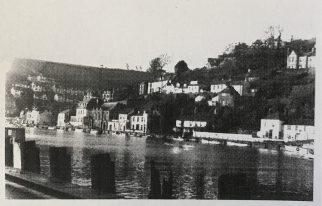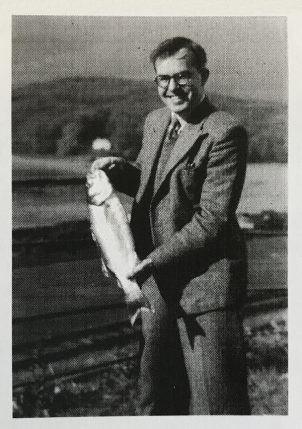Of Fishing Diaries by Donovan Kelley
“However do you remember all this?” asked my wife Betty.
“From my diaries, of course”.
“But all that detail of species, weights, numbers; even, of how they reacted to the hook?”.
“It’s all there. Photos too. Have a look”.
She had been reading my typescript of wartime fishing in India. The events described were in fact impressed vividly on my memory (far more vividly than most war experiences). Reference to diaries had been merely to check accuracy of detail.
Betty did not take up my suggestion that she read the diary. In not doing so she adhered to the widely held view that diaries are for the eye only of their author: not for general consumption. Publishers especially are wary of them – I can recall only one angling diary that was published.
It does however surprise me that so few sea anglers keep a diary. I cannot think of a single close acquaintance who does. In this we seem to be different from freshwater anglers. Why should this be? Are we as a body illiterate? Surely not. Are we then lazier? Possibly. Putting pen to paper after each fishing trip can be a chore – so why bother?
There are in fact many good reasons for taking this little extra trouble. Foremost is this. A diary, systematically recorded, enables us to discern features of the bass scene (and of our approach to it) that could otherwise escape us I can recall many examples from my own diaries. In the 1950’s and 60’s I was regularly taking the temperature of the water I was fishing in. When I analysed my catches in the Camel estuary by reference to temperature at high tide – the sea temperature – and at low tide – the river temperature – I found that the two could differ significantly; and if the river was running out warmer than the surrounding sea the bass would come into the mouth towards low tide. This applied also in other small estuaries I was fishing then, in Wales. If the river was likely to be cold, e.g. after snow or a frosty night, it would not be worth fishing. This could never have been detected without the systematic temperature recording in the diary.
It was my diary, too, that alerted me in 1967 to the exceptional abundance of the 1959 year-class. Instead of the usual broad mix of sizes, in modest numbers, I found I was getting – wherever I fished – good numbers of bass of a very tight size range, around 2½lb each. Scales revealed that these were all of the 1959 class. Anyone coming new to bass fishing in 1997, and recording his catches, would have found a similar dominance of 2½ pounders, this time of the 1989 class.

There have been many more instances where useful and interesting facts concerning bass have been pinpointed by the diary: best tide and weather for a particular site; most effective bait in different seasons; other species to be expected; whether variations in tackle – e.g. size of hook, length of trace – make a difference to catch rate. The list seems endless.
Those are the practical virtues of a diary: adding to our knowledge of the ways of bass (and incidentally benefiting our catch rate). There are other advantages, less tangible but equally worthwhile. It can be a heartening experience – especially in periods when fishing is poor, to go back over the years and relive those old catches all over again. Reliving too all the incidental experiences with which every fishing trip is punctuated: big fish hooked but lost, or merely seen; catches by companions; how a new rod or reel performs; unusual bird sightings. I once saw a light plane, overtaken by fog, crash-land on the cliffs behind me; I put it in my diary. As the years roll by (and bass catches decline) this for me is the real pleasure of a diary. It is also a virtually bottomless reservoir of material for writing, if one’s inclinations take one that way.

Arthur Ransome, known chiefly for his children’s books, also wrote about fishing. In one of his books he devoted a whole chapter to fishing diaries. He identifies another virtue of the diary: that it constitutes a useful safeguard against the catches getting subtly enlarged by the passage of time. This can so easily (and innocently) happen – and recently I had an instance of it, uncomfortably near home. Many years ago, with two colleagues, I was auditing the accounts of the local authority at Looe, in Cornwall. I had my tackle with me, and one evening they joined me on the quayside to fish under the lights for the pollack that often abounded there. It was a perfect late October evening, dark and very still, with the tide high. These were perfect conditions and I was soon catching pollack, the small harbour fish of about 3/4lb. One of my companions, Derrick, fancied his chances and had a go with my rod. Although it was a very light one there was no risk to it as only small fish were present. Quite soon the float disappeared, and Derrick struck. Immediately the rod arched alarmingly and a violent splashing on the surface 20 yards out told that this was no mere pollack. In fact he had hooked a good bass, and most fortunately it did not attempt to run, simply threshing about on the surface for several minutes while Derrick held on for grim death. Eventually we were able to “beach” it on some nearby steps. It weighed 5¼lbs, and next day the proud captor took it home.
Years passed, and our careers in the district audit service took different directions. I did not see Derrick again until quite recently, when by chance I ran across him in Plymouth. Over a nostalgic drink we recalled his stroke of luck at Looe. Derrick was quite sure that it had weighed 8lbs – and such was his conviction that I began to doubt my own memory. Later I checked with the diary – and there it was, 5¼lbs. Derrick had never fished again – but he had fallen victim to the Arthur Ransome syndrome. It does happen – and the diary, with its entry made at the time, sets the record straight and calls us to order. Ransome certainly had a point.
What form should a diary take? There are printed diaries available to-day with columns for all the basis data — date, place, catch etc. These were unknown in the early 1930’s, when I started my diary. I used ordinary exercise books, one for each year, with everything in simple narrative form. During the war when paper became very scarce I got hold of a large photo album and used it for both text and photos. After the war I got a local printer to do suitable forms, with columns for the basic data plus a wide one for incidental matter – fish hooked but lost (or merely seen), catches of companions (if any), unusual sightings of birds, seals, otters etc., and all the other interesting things that happen when fishing. It has served its purpose well and is still in use.
From ‘Life with Bass’ by Donovan Kelley